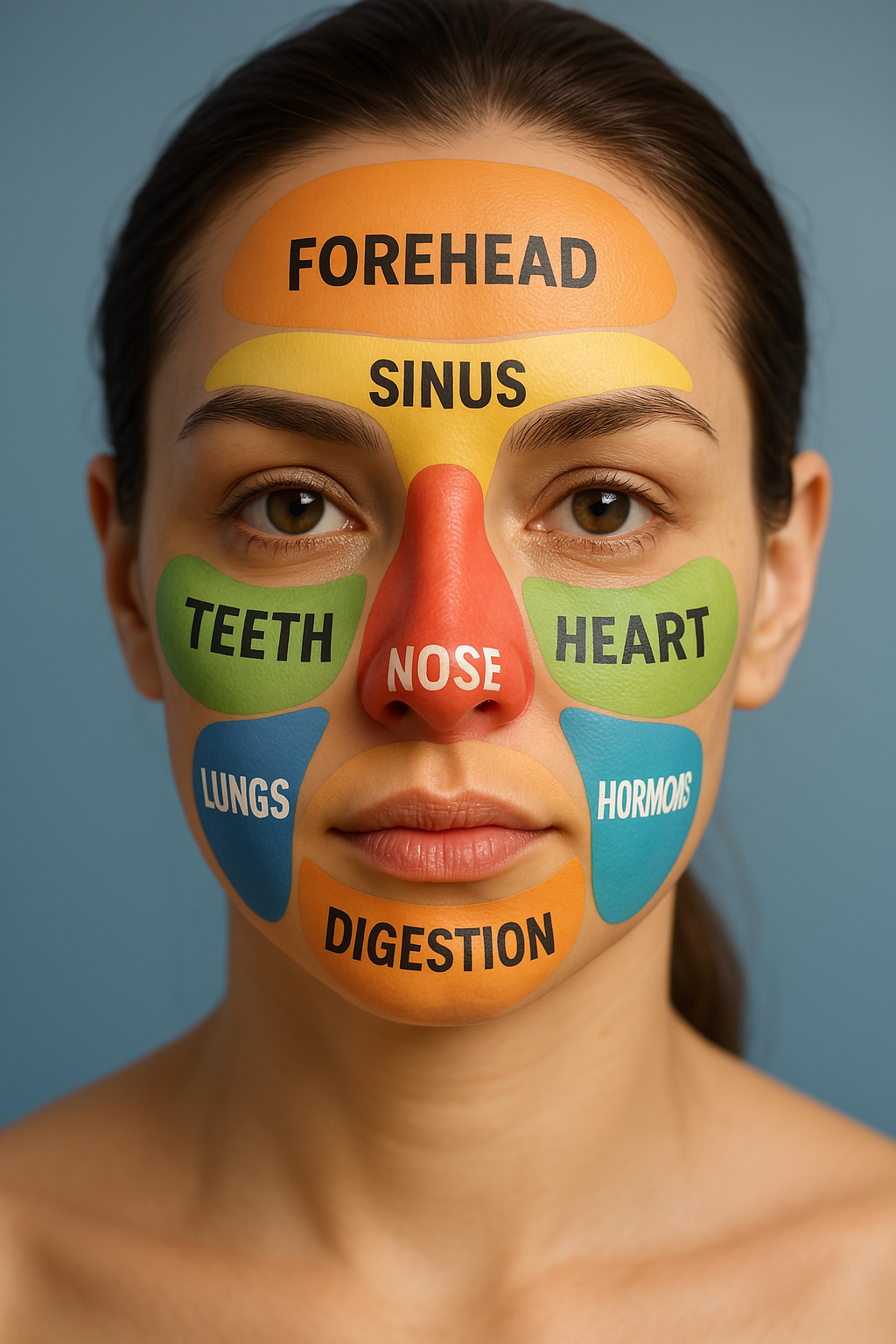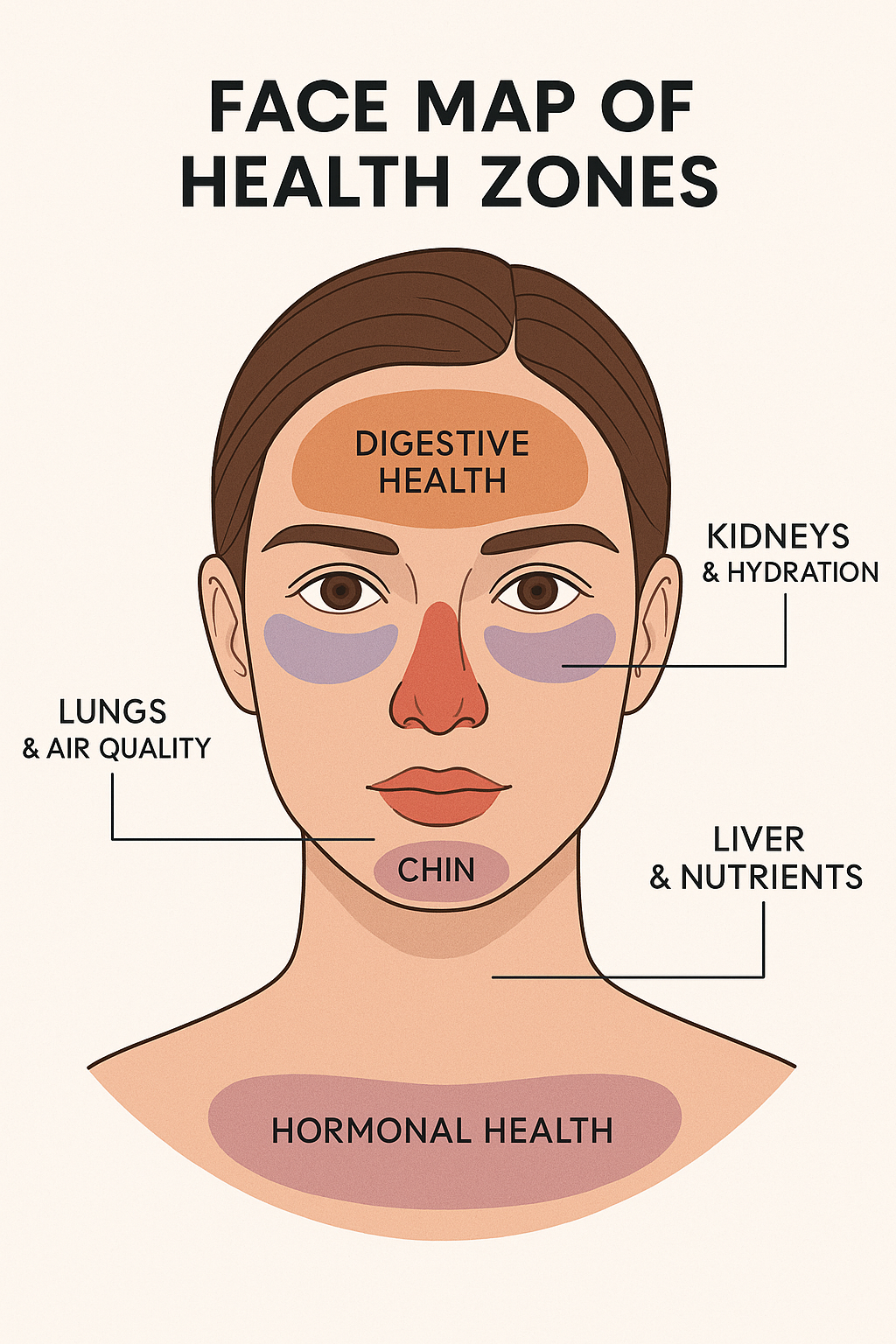Your Skin Is Speaking! 7 Shocking Health Problems Visible on Your Face !!!!
Is Your Face Trying to Tell You Something? Here’s What You’re Missing
Have you ever looked in the mirror and thought — Why is my skin suddenly breaking out? Or Why are these dark circles not going away even after 8 hours of sleep? You might try expensive creams or drink more water, but what if your skin is trying to say something deeper?
Here’s the truth — your skin, especially your face, is not just a beauty indicator. It’s a map of your internal health. From your liver to your lungs, every organ has a way of manifesting issues on your skin. And if you know what to look for, you can actually prevent serious health problems before they grow worse.
Let’s uncover what your face is trying to tell you — because your skin speaks before your doctor does.

Why You Should Never Ignore Facial Changes
As you read this, think about your own face. Maybe you’ve noticed:
-
Unusual acne on specific areas
-
Persistent redness
-
Dark patches or pigmentation
-
Puffiness around eyes
-
Deep lines forming earlier than expected
If you’ve brushed these signs off as “normal” or “stress-related,” you’re not alone. Most people ignore the face as a diagnostic tool. But dermatologists and holistic practitioners across the world now agree: your face is your body’s first health report card.
🔬 Research Speaks:
According to a study published in the Journal of Dermatology, around 62% of chronic health issues first show symptoms on the skin — and the face is the most visible area.
Let’s decode these facial clues one by one, and more importantly, what you should do next.
1. Forehead Breakouts – Your Digestive Health Alert 🚨
If you constantly see pimples or bumps on your forehead, your digestive system may be struggling. Poor digestion, constipation, or even liver toxicity can show up as acne in this region.
Possible Causes:
-
Irregular bowel movement
-
Too much processed food
-
High sugar intake
-
Lack of water
What You Can Do:
-
Drink warm lemon water every morning
-
Add fiber-rich foods (like oats, chia seeds, and fruits)
-
Avoid late-night eating
-
Use probiotics
👉 Your forehead is not reacting to your facewash — it’s reflecting your gut’s chaos.
2. Puffy Eyes & Dark Circles – More Than Just Lack of Sleep 💤
You might think that dark circles are from staying up late — and sometimes, yes, that’s true. But chronic under-eye darkness or puffiness can signal kidney stress or dehydration.
Possible Causes:
-
Salt-heavy diet
-
Low water intake
-
Overuse of painkillers
-
Hormonal imbalances
What You Can Do:
-
Increase hydration with coconut water or herbal teas
-
Cut down processed sodium
-
Get tested for vitamin B12 or iron deficiency
-
Sleep on your back to improve blood flow
👉 If your eyes look tired all the time — your kidneys might be tired too.
3. Nose Redness or Bumps – Heart and Blood Pressure Check ❤️
Your nose connects to your circulatory system. Redness, frequent oiliness, or little bumps here could signal blood pressure issues or stress on the heart.
Possible Causes:
-
High stress
-
Excess caffeine or alcohol
-
High cholesterol
-
Emotional distress
What You Can Do:
-
Check your BP regularly
-
Replace coffee with herbal teas
-
Practice breathing techniques
-
Include omega-3-rich foods (flaxseeds, walnuts, fish)
👉 A glowing nose isn’t always healthy — observe the texture and color.
4. Cheeks and Lungs – Breathing & Air Quality 🌬️
Breakouts or rashes on the cheeks are often linked to respiratory health. If you live in polluted areas or smoke (even passively), your cheeks may reflect it first.
Possible Causes:
-
Smoking or passive smoke
-
Allergies
-
Pollution exposure
-
Bronchial stress
What You Can Do:
-
Add indoor plants like snake plant or peace lily
-
Avoid synthetic fragrances in cosmetics
-
Practice deep breathing exercises
-
Consume antioxidant-rich foods (berries, green tea)
👉 Your cheeks may be the first to react to poor air — inside or outside your home.
5. Chin and Jawline Acne – Hormonal Imbalance Alert ⚠️
This is one of the most common areas where women especially notice breakouts — usually right before their period. But if you’re getting persistent acne on your chin, it could mean your hormones are imbalanced.
Possible Causes:
-
PCOS
-
Thyroid disorders
-
Excess dairy
-
Poor sleep hygiene
What You Can Do:
-
Get your hormone levels tested
-
Reduce dairy and sugar
-
Add flax seeds and fenugreek to your diet
-
Follow a sleep-wake cycle (circadian rhythm)
👉 If your chin acts up every month — listen to your hormones, not just your skin.
6. Pale or Dull Skin – Nutrient Deficiency Warning 🧬
When your skin looks dull, dry, or pale even after good skincare — it’s likely a deficiency in key vitamins like B12, Iron, or Vitamin D.
Possible Causes:
-
Vegetarian/vegan diet without supplements
-
Low sunlight exposure
-
Chronic fatigue or poor sleep
-
Poor gut absorption
What You Can Do:
-
Get a full blood panel done
-
Spend 15 mins in early sunlight
-
Include iron-rich foods (spinach, dates, lentils)
-
Supplement wisely based on test results
👉 Dullness on the outside may mean your body is hungry inside.
7. Skin Discoloration or Pigmentation – Liver & Hormone Check ⚙️
Uneven skin tone, patches, or melasma-like marks can indicate liver overload or estrogen dominance. This is especially common in women with hormonal contraception or frequent medication use.
Possible Causes:
-
Liver detox inefficiency
-
Birth control pills
-
Pregnancy or menopause
-
Frequent use of painkillers
What You Can Do:
-
Take a liver-supporting herb like milk thistle (under medical advice)
-
Add cruciferous vegetables (broccoli, cabbage)
-
Drink more water with lemon
-
Avoid chemical-heavy makeup
👉 Your skin tone isn’t just about melanin — it’s about metabolism and hormonal balance.
Your Face Is a Map — Are You Reading It Right?
Here’s something most people don’t realize: You don’t have to wait for illness to start making changes. If your face is showing early signs, that’s a gift — a chance to reverse the damage naturally.
We encourage you to start observing your skin more mindfully — not just as a beauty feature, but as a health monitor. Look closely at these zones:
-
Forehead = Digestive health
-
Eyes = Kidneys and hydration
-
Nose = Heart and BP
-
Cheeks = Lungs and air quality
-
Chin = Hormonal health
-
Skin tone = Liver and nutrients
When to See a Doctor
While your skin can offer powerful clues, it’s not a substitute for medical testing. If these signs are persistent or worsening, you must consult a dermatologist, general physician, or even a hormone specialist depending on the symptom.
Final Thoughts: Listen to Your Skin Before It Screams
Your skin is your body’s most visible organ. When it whispers through a pimple, a rash, or a patch — listen carefully. Because those whispers can turn into shouts if ignored.
So next time you look in the mirror, ask:
“What is my face trying to tell me today?”
skin health signs, face reflects health, health problems on face, skin and internal health, facial warning signs, skin signals, face symptoms disease, what skin reveals, skin diagnosis health, skin mirror body
